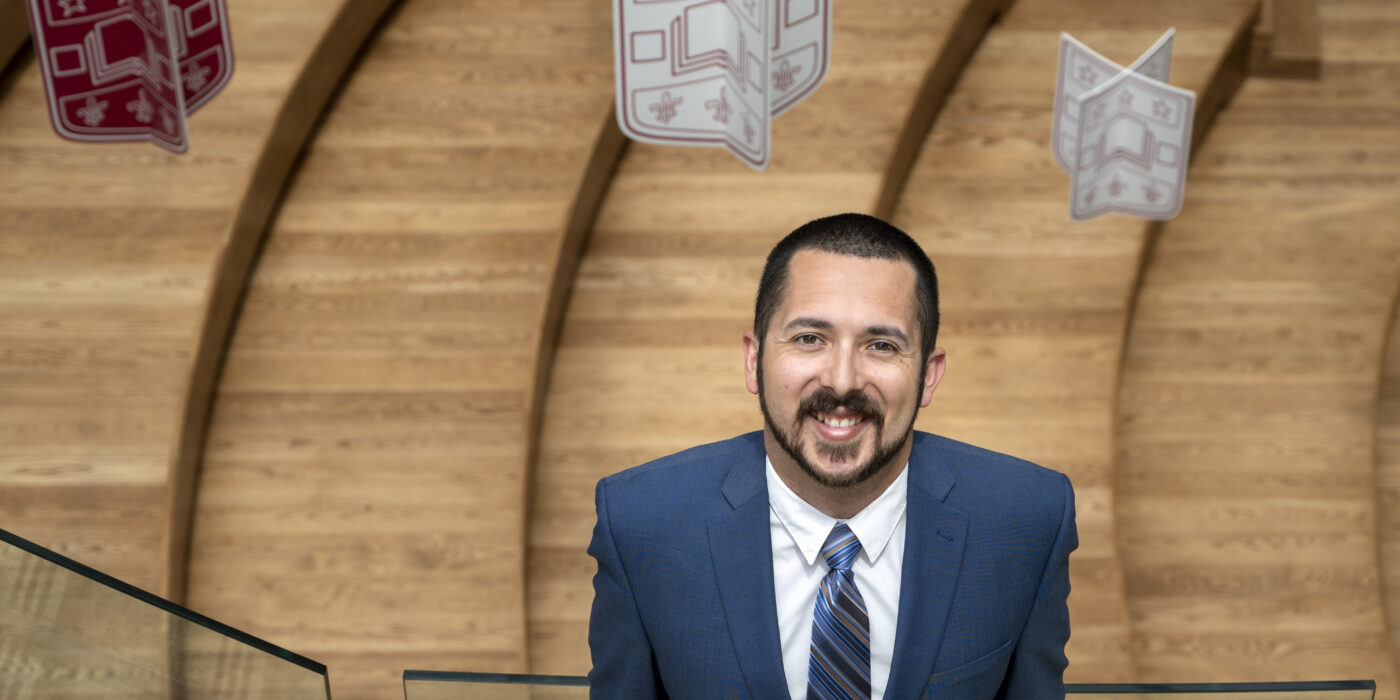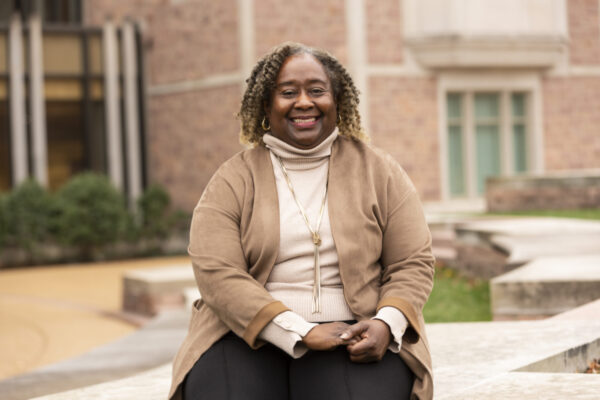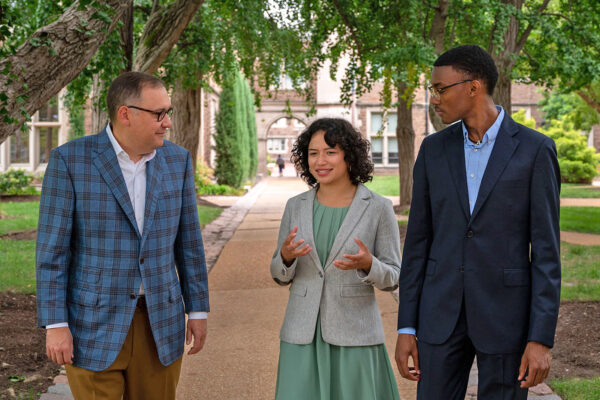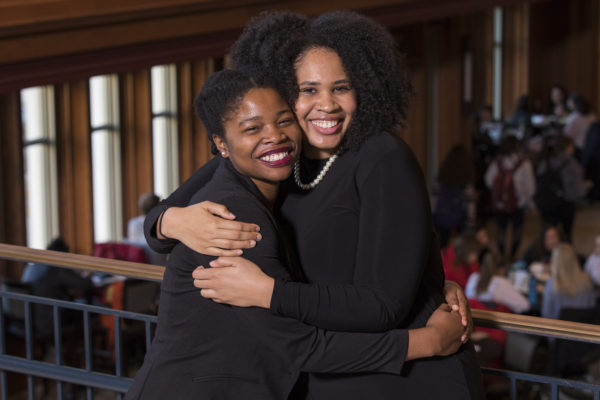Kris Campa stepped to the podium at the recent 35th anniversary celebration of the John B. Ervin Scholars Program, aware of the weight of the moment and the rich history behind an effort that he had just begun to lead.
Like the directors who came before him, he prepared to share with the audience the current state of the program and his vision for its future.
“I stood up in that moment and I got a little emotional. I had to take a couple breaths, because in my mind it couldn’t be real,” Campa recalled.
Fewer than 10 years before, he had been an Ervin Scholar himself. Now, he was there to lead one of the three signature merit scholars programs on the Danforth Campus. Founded in 1987 and named after John B. Ervin, the first African American dean of the School of Continuing Education at Washington University in St. Louis, the Ervin program has offered scholarships and community to over 900 students throughout its history.
“Standing in front of these people, many of them people who I had looked up to as role models during my undergraduate days, it all clicked into place,” he said.
I bring a level of love for this work. … I’m doing what I was meant to do.
Kris Campa
Campa is the first graduate of the program to lead it, and he brings with him a deep sense of connection to both the Ervin Scholars Program and WashU at large. When speaking about his role, he refers to it not as a job, but as a calling.
“I bring a level of love for this work that some people can get to, but they don’t have right off the bat when they start a new job. I’m doing what I was meant to do.”
Michelle Purdy, a fellow Ervin alum and an associate professor of education in Arts & Sciences, called this “a special, full-circle moment.”
“Kris, as director and a relatively young alum, is uniquely positioned to understand the program’s pillars and values,” she said.
Campa is thinking carefully about what’s next for the program. The future will be informed by the four pillars upon which the program was founded: academic excellence, leadership, community service and a commitment to diversity — all values that Campa also embodies.
“The Ervin Scholars Program has always been, I think, a group of students that is willing to push the university for better,” he said. “And not just better for any particular group, but better for everyone.”
The question now is how to better support those extraordinary students.
“I want us to be able to support them in more ways than just scholarship dollars,” he said. “I want to see them get connected with internships and summer research programs and be supported and funded in that process so that we can say: ‘This is your opportunity to go out and try something for the first time.’”
Teaching diversity through fiction
In addition to leading the Ervin Scholars Program, Campa is a genre writer particularly interested in fantasy, science fiction and horror. He recently published his first novel, “Sentinel’s Soul,” an urban fantasy story set in St. Louis incorporating themes of identity, self-acceptance and racism. The main character is Arturo Morales, a hybrid supernatural creature whose responsibility is to keep the magical world separate from the human world. After a terrorist attack at the St. Louis airport sparks a battle between two magical races, Arturo must confront the conflict at the heart of his identity.
“As a hybrid creature, he has lineages from both sides of these races as well as human,” Campa said. “I think a lot of folks in our world are, like myself, mixed in terms of our racial identities and must ask, ‘What does it mean that I don’t fit in any one category but have all of it inside of me?’”
Growing up in Versailles, a small town in central Missouri, Campa excelled academically early on.
“I grew up in a single-parent household. Mom was a teacher’s aide at the local high school, and she was very adamant about doing well in school.”
Because he loved STEM courses and had a sterling academic record, he decided medicine was the way to go. “There were doctors in my hometown who were well-respected, who had plenty to offer their families. I said, ‘That’s what I’ll be.’”
His plans for a medical career initially got him interested in WashU, as he was aware of its stellar reputation for both the pre-med program and medical school, not to mention scholarship opportunities. He vividly recalled the day he visited campus for the first time and knew he wanted to attend college here.
“I remember leaning against one of the trees by Mudd Field and just looking at everything. I saw Siegel Hall at the end, I saw the law school and just thought, ‘When I think of college, this is what I’m thinking of,’” he said. “I remember going home and saying to my mom, ‘I’m going to apply there and I’m going to apply early decision.’”
Charting another path
Yet before completing his first year, he realized he did not want to be a doctor. His interest was, rather, in English and writing.
“I’m first in my family to go to college. And for me, it had always been: I’m going to be a doctor. I’m going to make a lot of money because I need to do that for my family. The prospect of not being a doctor was scary.”
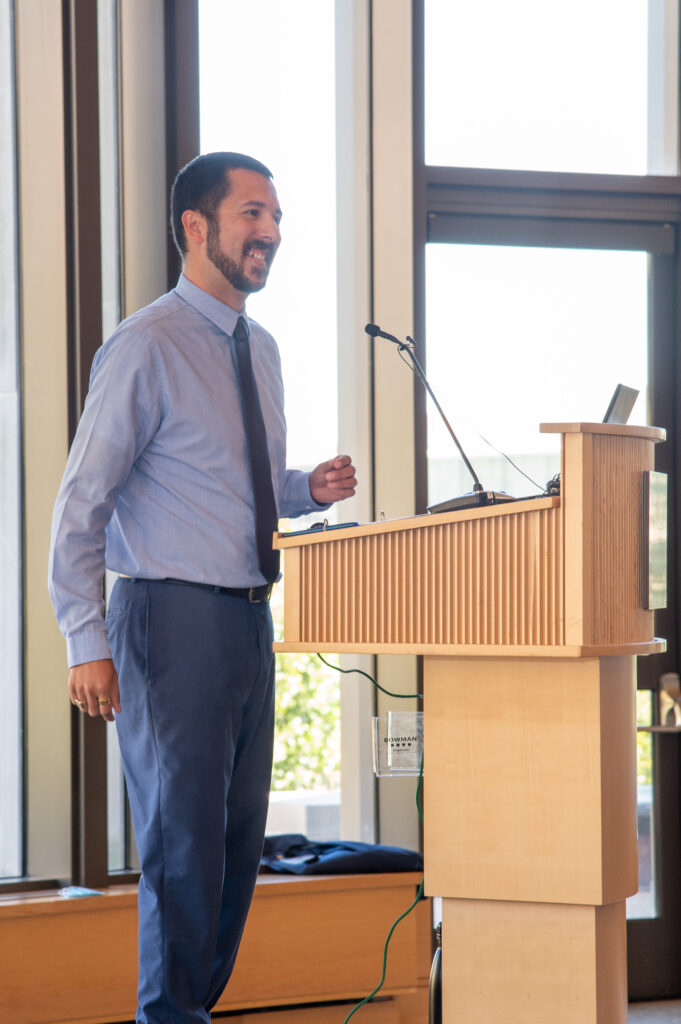
It was James McLeod, former vice chancellor for students and founder of the Ervin Scholars Program, who encouraged Campa to commit to his passion.
“I remember the conversation I had with Dean McLeod my sophomore year,” he said. “I told him, ‘I don’t know that I can make a career out of writing,’ and he replied by saying, ‘If you want to write and you love writing, keep writing. Do the best you can at it and the money will find you.’ And he was absolutely right.”
Campa earned a bachelor’s degree in English from Arts & Sciences in 2013. With McLeod’s encouragement, Campa eventually entered the low-residency master’s in fine arts program at Seton Hill University, one of the few graduate writing programs geared toward genre fiction, the kind of writing he loved best.
While still an undergraduate, he used his creativity and writing prowess as part of Black Anthology, a performance group on campus dedicated to exploring themes within the Black community through works written, choreographed and directed entirely by Washington University undergraduates. A fellow Ervin Scholar encouraged him to join as a first-year student and, by senior year, Campa served as director.
Wilmetta Toliver-Diallo, a senior assistant dean in Arts & Sciences, remembered Campa’s contributions to the group as going well beyond his role as director or his input on the script team.
“What struck me about Kris as a student leader was his ability to connect with a variety of people on an individual level,” she said. “He was able to make anyone feel that his time and attention was completely devoted to understanding who they were. Kris was a natural coach.”
It was Toliver-Diallo who gave Campa the opportunity to use his natural leadership skills in a student affairs role following his graduation from WashU, when he rejoined the Ervin Scholars Program as part of its leadership team for a one-year opportunity helping to re-envision how Ervin could fit within the larger university. Robyn S. Hadley, the former Ervin Scholars director, decided to keep him on past his initial appointment.
“The Office of Scholar Programs was founded and formed during that time, so we brought together the three scholars programs — Ervin, Danforth and Rodriguez — for the first time in any of our histories,” Campa said. “We were now able to share resources and staff and learn what it meant to be a larger scholar community. I loved every moment of it.”
Later, he became an assistant dean at the McKelvey School of Engineering, where he worked in the advising office and focused on strategic initiatives designed to support low-income, first-generation and minority students, students whose experience shared much with his own. His time at McKelvey eventually led him back home to the Ervin Scholars Program.
Today, Campa uses his mentorship gifts both inside and outside the classroom. Not only does he mentor students in his capacity as Ervin director, but he also teaches creative writing in University College, an experience that has proven transformative.
“I taught my first class in January of 2017. When I stood up in the front of the classroom for the first time, I absolutely fell in love with it,” he said.
He now teaches fantasy, science fiction and horror courses and often emphasizes the ways in which social justice issues interact with these genres.
“He is willing to grapple with the hard questions, including those about the persistent inequities that plague our society, especially at the intersection of race and socio-economic status, and also celebrates and honors the contributions and sacrifices of those historically marginalized in U.S. society,” Purdy said.
‘Believe the community better’
One of Campa’s leading motivations is to “try to believe the community better” wherever he is. He still remembers the wide-eyed excitement the first time he stepped onto WashU’s campus, the immense sense of possibility that he felt. That awe has transformed and deepened throughout his years at WashU. Today, it takes the form of wanting the university to be better for those coming after him.
“I’ve been here for a while and can see the areas of growth and improvement the university has,” he said. “I want to see our scholars continue to be successful on a campus that is doing more to support diversity, equity and inclusion work than it has ever done.”
Campa sees a clear connection between the work he does as a writer and writing teacher and the work he does for the Ervin community.
“When you talk about diversity and racism in a fantasy world, people get behind it a little bit easier. And they understand it a little easier,” he said. “That’s what we have always been trying to do as Ervin Scholars. We want to leave the world better than we found it.”
